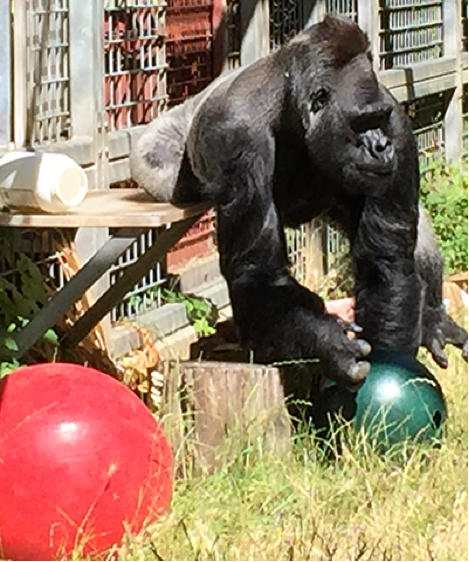Cincinnati Zoo Continues Efforts to Bring Isolated Gorilla Home
 Court brief supports moving Ndume to Cincinnati
Court brief supports moving Ndume to Cincinnati
CINCINNATI (January 11, 2019) – In a brief filed in federal court yesterday, the Cincinnati Zoo & Botanical Garden (CZBG) along with renowned gorilla experts refute the ill-informed claims of The Gorilla Foundation (TGF) that the transfer of silverback gorilla Ndume [nnn-doo-may] will hurt or even kill him.
“Common sense and scientific evidence contradict TGF’s claim. We’ve successfully managed 160 gorilla transfers to and from Association of Zoos and Aquariums (AZA) accredited zoos over the last decade,” said Kristen Lukas, Chair of the Gorilla Species Survival Program (GSSP), which oversees the care of more than 350 gorillas in nearly 50 AZA zoos. “Moving gorillas is a safe and necessary aspect of ensuring proper socialization, maximizing animal welfare, and enriching the lives of all gorillas in human care.”
The Zoo has been working to bring Ndume back to his original home in Cincinnati since August, 2018, when the GSSP recommended his transfer. The 37-year-old gorilla was born in Cincinnati and moved to The Gorilla Foundation (TGF) in California in 1991 to be a social companion for female gorilla Koko. The loan agreement, which was clarified and updated in 2015, stated plainly and unequivocally: “Upon the death of ‘Koko’, ‘Ndume’ will be placed at an AZA institution recommended by the Gorilla Species Survival Plan and the Cincinnati Zoo & Botanical Garden.” When TGF failed to cooperate with CZBG efforts to move Ndume, the Zoo was forced to take legal action.
“What is terrible for gorillas is being left in isolation, which is what’s happening to Ndume right now at TGF,” said Lukas. “That’s why all parties agreed that Ndume would leave the Foundation when Koko passed away—so Ndume wouldn’t be alone.”
“The Cincinnati Zoo and Gorilla SSP cared deeply for Koko when she was alive and respected the need for all gorillas to be with or near other gorillas. Despite Koko and Ndume not cohabitating, they were aware of the other’s presence, and we didn’t have the heart to bring Ndume home to Cincinnati and leave Koko completely isolated from other gorillas,” said Cincinnati Zoo’s Curator of Primates Ron Evans. “Being around other gorillas is a foundation natural history need and although humans can help gorillas along on their life journey they are no replacement for the company of other gorillas. It is sad and ironic that The Gorilla Foundation is now not honoring its agreement and is willing to keep Ndume from joining a great social community of gorillas at Cincinnati.”
The GSSP’s position is supported by CZBG, leading gorilla experts, the AZA and PETA. All agree that Cincinnati Zoo can provide the best home for Ndume and that he should be moved as soon as possible.
A hearing is set for January 24, 2019, in California court.
The Cincinnati Zoo has been caring for gorillas since 1931 and has made significant contributions to gorilla populations in Zoos across the country. The 50th gorilla born at the Zoo, Elle, lives in a family group with one of the first gorillas born in Cincinnati, 48-year-old Samantha.
There are about 765 gorillas in zoos worldwide including approximately 350 that are managed by the GSSP. Western lowland gorillas are critically endangered in the wild, with approximately 300,000 individuals in the declining population. Due primarily to habitat destruction caused by logging, mineral mining and agricultural expansion, wild gorilla numbers continue to shrink. The bushmeat trade – the killing of wild animals to be used as human food – is also a major threat to the western lowland gorilla population throughout the Central African rainforests. More than 1,000 gorillas are illegally poached for the bushmeat trade each year.
The Cincinnati Zoo supports wild gorilla conservation efforts like the Nouabalé-Ndoki Project in the Republic of Congo. This project includes the Mbeli Bai Study, the longest running research being done with wild western lowland gorillas. Through research, local education programs, publications and documentaries, the Mbeli Bai Study and other gorilla related efforts there are raising international awareness for gorillas and their struggle for survival. For more information, visit www.cincinnatizoo.org.

